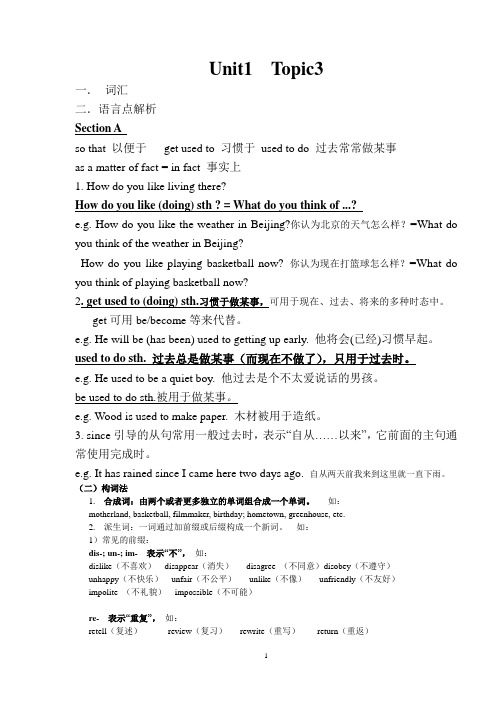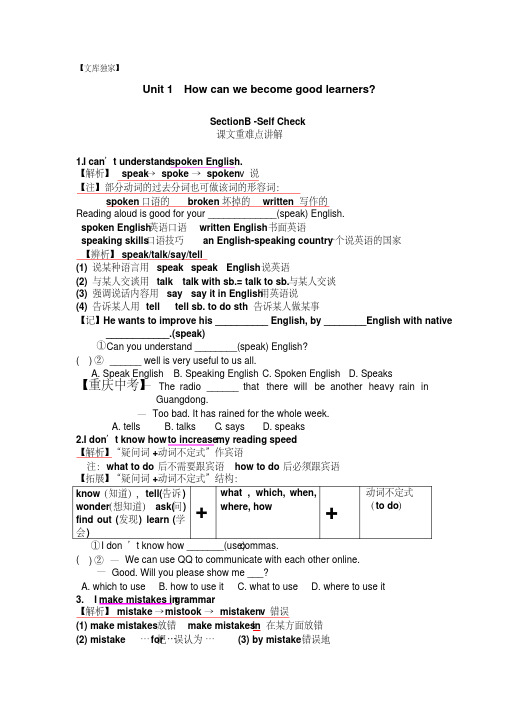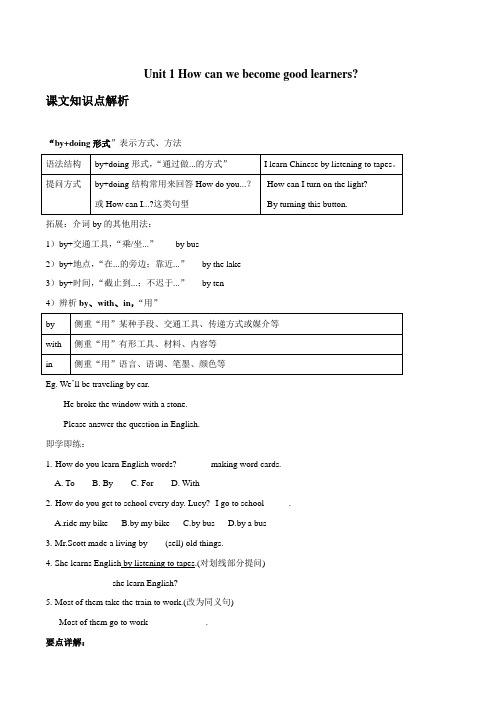九年级英语上Unit1知识点归纳上课讲义
Unit1语法知识点九年级英语上册

学生教师上课内容九年级上册Unit 1复习学科英语第()课时年级初三上课时间Unit 1课堂教学知识点Unit1 Topic1一. 语法:一) 现在完成时1. 定义:现在完成时是过去发生并且已经完成的动作对现在造成影响或后果,过去某一时间开始并一直持续到现在并且有可能还会持续的动作或状态。
2.时间词:already、just、ever、never、before、yet、in recent years / months…、in the past …years / months…、※※※so far、for + 时间段、since + 时间点/ 句子(already,just多用于肯定句中,ever,yet,never多用于疑问句和否定句中)3. 公式:主语+ have / has + V过去分词+ 其他4. 句式:肯定句:主语+ have / has + 过去分词+ 其他否定句:主语+have / has + not + 过去分词+ 其他一般疑问句:Have / Has + 主语+ V过去分词+ 其他?Yes, 主+ have / has. 或No, 主+ haven’t / hasn’t.特殊疑问句:特殊疑问词+ 一般疑问句(have / has……)5. 动词过去分词变化规则:(1) 规则变化:a. 一般情况加ed,如:helped worked played cleaned等;b. 以不发音的字母e结尾直接加d,如:used等;c. 以“辅音字母+ y ”结尾,变y为i,再加ed,如:tried studied cried carried等;注:“元音字母+ y”结尾,直接加ed;d. 以重读闭音节结尾,末尾只有一个辅音字母,双写该辅音字母,再加ed,如:dropped stopped planned除y与w结尾的;(2) 不规则变化背九上课后不规则表二) have gone to / have been to二.灵活运用(一)1.though / although 与but 不能同时出现;( because 与so不能同时出现)2.succeed in doing sth (be successful in doing sth.) 成功做某事3.not only……but also……不仅……而且……4.afford sth. 负担某物;afford to do sth. 买得起某物;5.little / a little few / a few 注:so many / much / few / little that6. 复习感叹句(常出现相关词汇:progress / experience; excellent等)1) How + 形容词/ 副词+ ( 主语+ 谓语) !2) What + a / an + 形容词+ 名词单数+ (主语+ 谓语)!What + 形容词+ 名词不可数或名词复数+ (主语+ 谓语)!(二)1.must 如:It must be fun. (还有两个表猜测用法的情态动词:may /can’t )2.take part in = join in = be in 与join区别3.不定代词+ adj. 如:something meaningful4.spend 、take、cost、pay5.in the 1960s 二十世纪六十年代in the early / late 1960s 二十世纪六十年代初/ 末6.7.others, the others , other, the other,another用法8.enough + n. adj. / adv. + enough9.put on、put up、put away三.词性转换rapid rapidly succeed success successful successfullymedicine medical please pleased (un) pleasantpleasure四.固定搭配1. take place发生,进行2. make (rapid) progress 取得(快速的)进步3. keep in touch with sb. 和某人保持联系(get in touch with sb. 和某人取得联系)4. see the changes oneself (herself / himself /……) 亲眼见证变化5. in recent years 在近几年6. satisfy people’s needs 满足人们的需求7. play chess 下象棋8. have a chance to receive a good education 有机会接受好的教育9. enjoy good medical care 享受好的医疗护理10. far away 远离的,遥远的11. by letter or telegram 通过信件或电报(by + Ving) ※※※12. play an important part in people’s lives / doing sth. 在人们的生活中/做某事起重要的作用13. in one’s spare / free time 在某人的空闲时间14. have no time to travel没时间旅行15. places of interest名胜古迹16. W hat’s more 而且17. volunteer activities 自愿者活动18. ring roads 环路19. more than forty years = over forty years 四十多年20. by the way顺便说一下五.重点句型1. Did you have a good summer holiday? 你有一个愉快的暑假吗?2. How was your trip? 你的旅行怎么样?3. Great changes have taken plac e there and my hometown has bee more and more beautiful.那儿发生了巨大的变化并且我的家乡变得越来越美了。
仁爱英语九年级上U1T1语言点详解

Unit1 Topic3一.词汇二.语言点解析Section Aso that 以便于get used to 习惯于used to do 过去常常做某事as a matter of fact = in fact 事实上1. How do you like living there?How do you like (doing) sth ? = What do you think of ...?e.g. How do you like the weather in Beijing?你认为北京的天气怎么样?=What do you think of the weather in Beijing?How do you like playing basketball now? 你认为现在打篮球怎么样?=What do you think of playing basketball now?2. get used to (doing) sth.习惯于做某事,可用于现在、过去、将来的多种时态中。
get可用be/become等来代替。
e.g. He will be (has been) used to getting up early. 他将会(已经)习惯早起。
used to do sth. 过去总是做某事(而现在不做了),只用于过去时。
e.g. He used to be a quiet boy. 他过去是个不太爱说话的男孩。
be used to do sth.被用于做某事。
e.g. Wood is used to make paper. 木材被用于造纸。
3. since引导的从句常用一般过去时,表示“自从……以来”,它前面的主句通常使用完成时。
e.g. It has rained since I came here two days ago. 自从两天前我来到这里就一直下雨。
(二)构词法1.合成词:由两个或者更多独立的单词组合成一个单词。
2020人教版九年级英语上Unit1课文重难点讲解

【文库独家】Unit 1 How can we become good learners?SectionB -Self Check课文重难点讲解1.I can’t understand spoken English.【解析】speak→spoke →spoken v说【注】部分动词的过去分词也可做该词的形容词:spoken 口语的broken 坏掉的written 写作的Reading aloud is good for your _____________(speak) English.spoken English 英语口语written English 书面英语speaking skills 口语技巧an English-speaking country 一个说英语的国家【辨析】speak/talk/say/tell(1) 说某种语言用speak speak English 说英语(2) 与某人交谈用talk talk with sb.= talk to sb. 与某人交谈(3) 强调说话内容用say say it in English 用英语说(4) 告诉某人用tell tell sb. to do sth 告诉某人做某事【记】He wants to improve his __________ English, by ________English with native ____________.(speak)①Can you understand ________(speak) English?( )②______ well is very useful to us all.A. Speak EnglishB. Speaking EnglishC. Spoken EnglishD. Speaks【重庆中考】—The radio ______ that there will be another heavy rain inGuangdong.—Too bad. It has rained for the whole week.A. tellsB. talksC. saysD. speaks2.I don’t know how to increase my reading speed【解析】“疑问词+动词不定式”作宾语注:what to do 后不需要跟宾语how to do 后必须跟宾语【拓展】“疑问词+动词不定式”结构:know(知道),tell(告诉)wonder(想知道)ask(问) find out (发现) learn (学会) +what , which, when,where, how +动词不定式(to do)①I don’t know how _______(use) commas.( )②—We can use QQ to communicate with each other online.—Good. Will you please show me ___?A. which to useB. how to use itC. what to useD. where to use it3. I make mistakes in grammar【解析】mistake→mistook →mistaken v错误(1) make mistakes 放错make mistakes in在某方面放错(2) mistake …for… 把…误认为… (3) by mistake 错误地。
新目标人教版九年级英语上册Unit1全单元知识点归纳

Unit 1 How can we become good learners?课文知识点解析“by+doing 形式”表示方式、方法拓展:介词by 的其他用法:1)by+交通工具,“乘/坐...” by bus2)by+地点,“在...的旁边;靠近...” by the lake3)by+时间,“截止到...;不迟于...” by ten4)辨析by 、with 、in ,“用”Eg. We ’ll be traveling by car.He broke the window with a stone.Please answer the question in English.即学即练:1.-How do you learn English words? -_____making word cards.A. ToB. ByC. ForD. With2.-How do you get to school every day. Lucy? -I go to school _____.A.ride my bikeB.by my bikeC.by busD.by a bus3. Mr.Scott made a living by____(sell) old things.4. She learns English by listening to tapes.(对划线部分提问)_____ ______ she learn English?5. Most of them take the train to work.(改为同义句)Most of them go to work ______ ______.要点详解:Section A1.by asking the teacher for help通过向老师求助。
(P1)1)by,“通过;靠”,后加名词/代词/动名词。
Eg. He had to do all the work by hand.2)ask (sb)for sth,“向某人要某物;要求某人某事”。
Module 1 Unit 1 外研版英语九年级上册知识点详解

外研版英语九(上)Module 1 Wonders of the world知识点详解Unit 1What is a wonder of the world?★(A3).【知识点再现】Let’s call Wonder of the World and join in the discussion. 我们给《世界奇观》节目打电话,加入讨论吧。
【知识点1】wonder可作动词或名词,其用法如下:①wonder作名词,意为“奇迹;奇观”时,是可数名词,其复数形式为wonders。
如:We have visited many wonders of the world. 我们已经参观了许多世界奇观。
The Great Wall is one of the seven wonders of the world. 长城是世界上七大奇迹之一。
②wonder作名词,意为“惊叹;惊奇”时,是不可数名词。
常用的句型有:It’s a wonder that...令人惊奇的是……;It’s no wonder that... 难怪……。
如:It’s no wonder that he is late. 难怪他迟到了。
It’s a wonder (that) more people weren’t hurt. 奇怪的是没有更多的人受到伤害。
③wonder作动词,意为“想知道”,相当于want to know,后面接who, what, why, where, if或that等引导的宾语从句或“疑问词+不定式”构成的短语。
如:I wonder who she is. 我想知道她是谁。
She wondered what the child was doing. 她感到疑惑,孩子究竟在干什么。
I wonder why Ann is late. 我想知道安为什么迟到了。
I wonder (that) she has won the race. 我对她赢了比赛感到惊讶。
九年级上册英语unit1知识点

九年级上册英语unit1知识点九年级上册英语Unit 1 知识点Unit 1是九年级上册英语学习的第一个单元,主要包括了一些常见的语法和词汇知识。
本文将分为两个部分进行讲解。
第一部分是语法知识。
这一部分主要涉及的内容有现在进行时、一般现在时和一般过去时的用法。
首先是现在进行时,表示现在正在进行的动作。
例如:I am reading a book.(我正在读书)这里用的是be动词(am) + 动词的ing形式(reading)。
其次是一般现在时,表示经常或习惯性的动作。
例如:She always goes to bedat 10 o'clock.(她总是十点上床睡觉)这里用的是动词的原形(go)加上s或es(goes)。
最后是一般过去时,表示过去发生的动作或状态。
例如:They played basketball yesterday.(他们昨天打篮球)这里用的是动词的过去式(played)。
第二部分是词汇知识。
这一部分主要包括了家庭成员、学校活动以及体育运动等方面的词汇。
首先是家庭成员,如father(父亲)、mother(母亲)、brother(兄弟)、sister(姐妹)等。
其次是学校活动,如study(学习)、write(写作)、read(阅读)、listen(听力)等。
最后是体育运动,如basketball(篮球)、football(足球)、swimming(游泳)、running(跑步)等。
除了以上的语法和词汇知识外,Unit 1还涉及了一些其他的重要内容。
例如,名词的复数形式。
名词的复数形式一般在词尾加上s或es。
例如:book - books(书-书籍)、pen - pens(笔-钢笔)等。
另外,还有形容词的比较级和最高级形式。
形容词的比较级一般在词尾加上er,最高级在词尾加上est。
例如:good - better - best(好-更好-最好)、hot - hotter - hottest(热-更热-最热)等。
[全]人教九年级英语上unit1单元重难点归纳与详解
![[全]人教九年级英语上unit1单元重难点归纳与详解](https://img.taocdn.com/s3/m/c2d5c827f90f76c661371ad1.png)
人教九年级英语上unit1单元重难点归纳与详解1、by引导的方式状语:A: How do you study for a test?你怎样为考试而学习?B: I study by working with a group.我通过小组合作的方式学习。
"by+ doing”表示通过某种方式、方法或手段,此时by短语用作状语。
如:By working hard I made great progress this term.通过刻苦努力,我在本学期取得了巨大进步。
You can switch the computer on by pressing the big button.按那个大按钮你就能打开电脑。
2、形式主语和形式宾语的用法和例句:It's too hard to understand spoken English. 我理解不了英语口语。
it 在句中做形式主语Why did Wei Fen find it difficult to learn English? 为什么韦芬发现学英语很难?it在句中做形式宾语动词+it+形容词+动词不定式(动词通常有:think,make,find,feel)He thought it hard to pass the exam.考题:Try singing some English songs, and you'll find it interesting _______ a foreign language.A: learning B: learns C: learn D: to learn3、“疑问词+不定式”结构I don't know how to increase my reading , speed. 我不知道如何提高我的阅读速度。
how to increase 是“疑问词+不定式”结构。
疑问词what, which, how, when, where, whether等与不定式连用,构成“疑问词+不定式(短语)”,在句中常用作主语、表语或宾语。
英语九年级上册unit1知识点

英语九年级上册unit1知识点英语九年级上册Unit 1 知识点Unit 1是英语九年级上册的第一个单元,主要涉及到一些基础的语法、词汇和阅读理解技巧。
本文将对Unit 1中的重要知识点进行探讨和总结。
1. 一般过去时(Simple Past Tense)一般过去时表示过去某个具体的动作或状态。
动词过去式的构成方式有很多规则,如一般情况下在动词末尾加上-ed,例如:worked, played。
但也有不规则的动词,要记住其过去式的形式,如:went, ate。
注意一般过去时的否定形式和疑问形式的构成。
2. 频度副词(Adverbs of Frequency)频度副词用来表示某个动作或状态发生的频率。
常见的频度副词有always, often, sometimes, rarely, never等。
这些副词可以在句子中放在动词之前或者句末。
3. 含有情态动词的句子情态动词有can, could, may, might, must, shall, should, will,would等。
它们用来表示能力、可能性、必要性、推测等。
情态动词在句子中一般不单独使用,后面需要加上动词原形来表示具体的动作。
4. 名词性从句(Noun Clauses)名词性从句在句子中扮演名词的角色,常见的引导词有that, what, where, whether等。
名词性从句可以作为主语、宾语或表语。
5. 阅读理解技巧阅读理解是英语学习中的一个重要环节,需要掌握一些技巧来提高阅读理解能力。
例如,先快速浏览全文,了解大意;注意关键词,找出与问题相关的信息;根据上下文推测词义等。
通过对Unit 1中的知识点进行学习和掌握,我们能够更好地理解和运用英语语法知识,提高自己的阅读和写作能力。
在学习过程中,我们要尽量多做练习,巩固所学知识,同时可以积累一些常用的短语和词汇,提高自己的英语表达能力。
除了掌握基础知识点,我们还可以通过学习英语歌曲、影视剧等来提高英语听力和口语能力。
- 1、下载文档前请自行甄别文档内容的完整性,平台不提供额外的编辑、内容补充、找答案等附加服务。
- 2、"仅部分预览"的文档,不可在线预览部分如存在完整性等问题,可反馈申请退款(可完整预览的文档不适用该条件!)。
- 3、如文档侵犯您的权益,请联系客服反馈,我们会尽快为您处理(人工客服工作时间:9:00-18:30)。
九年级英语上U n i t1知识点归纳Unit 1 How can we become good learners? 课文知识点解析“by+doing形式”表示方式、方法拓展:介词by的其他用法:1)by+交通工具,“乘/坐...” by bus2)by+地点,“在...的旁边;靠近...” by the lake3)by+时间,“截止到...;不迟于...” by ten4)辨析by、with、in,“用”Eg. We’ll be traveling by car.He broke the window with a stone.Please answer the question in English.Section A1.by asking the teacher for help通过向老师求助。
(P1)1)by,“通过;靠”,后加名词/代词/动名词。
Eg. He had to do all the work by hand.2)ask (sb) for sth,“向某人要某物;要求某人某事”。
Eg. My mother asked me for help yesterday.2.Do you have conversations with friends in English?你和朋友用英语说话吗?(P2)conversion,“交谈;谈话”。
与动词have/hold连用时,须加不定冠词,但与动词make连用时,不加不定冠词。
常用短语有:have/hold a conversion with...“与...交谈/谈话”;make conversion“闲谈;搭讪” be in a conversion with...“与...在谈话”Eg. He had a conversation with his son yesterday.3.What about reading aloud to practice pronunciation?朗读练习发音呢?(P2)1)What about...?= How about...?“...怎么样?”2)辨析Eg. Reading aloud is different from reading loudly.朗读课文与大声地读课文是有区别的。
Don’t talk so loud.不要那么高声的谈话。
3)practice,动词,“练习”,后加名词、代词、动名词。
练习:They practice _____(speak) English every day.4.It’s too hard to understand spoken English. 听懂英语口语太难了。
(P2)1)It+be+adj+for/of sb+ to do sth.Eg. It’s dangerous for children to play with fire.2)too...to...“太...而不能...”. Eg. He is too young to join the party.注意:not...enough to.../ so...that...练习:The girl is ____ tired ____ she could walk any more.A.too; toB.not; enoughC.so; that5.I have to finish reading a book and give a report next Monday.(P2)我必须读完一本书,以便下周一作报告。
1)finish“完成”,后加名词、代词、动名词。
Eg. I finished doing my homework half an hour ago.拓展:后加动名词的动词及短语:enjoy/practice/finish/mind doing sth keep (on) doing sthbe busy (in) doing sth have fun doing sth feel like doing sthlook forward to doing sth can’t help doing sth2)give a report“作报告”,make a report“写报告”,have a report“听报告”6.Just read quickly to get the main ideas at first.(P2)一开始只管快速阅读获取文章大意就可以了。
1)just,副词,“请;只管...就好了”。
Eg. Just come here a moment.2)at first,“起初;一开始”。
Eg. At first we used hand tools. Later we had machines.注意:first of all=first,表示顺序,后往往用next,then等练习:______I didn’t want to go, but I soon changed my mind._______, open the windows, the turn off the gas, and if necessary, call an ambulance.7.Well, be patient.(P2)哦,耐心点。
patient,形容词,“有耐心的”。
(1)be patient with sb对某人有耐心;(2)be patient of sth忍耐某事Eg. We should be patient with our students. You should learn how tjo be patient of pains.拓展:patient还可作名词,“病人”。
8.The more you read, the faster you’ll be.(P2)你读的越多,你阅读的速度就越快。
“the+比较级...,the+比较级...”,意为“越...越...”Eg. The more you smile, the happier you will feel.拓展:“比较级+and+比较级”意为“越来越...”Eg. The weather becomes colder and colder.9.Why did Wei Fen find it difficult to learn English?(P3)为什么魏芬发现学习英语很那?find+it+adj+to do sth“发现做某事...”Eg. I find it very interesting to learn English.10.What is the secret to language learning?(P3)语言学习的秘诀是什么?the secret to...“...的秘诀” eg. Her age is a secret to us all.11.But I was afraid to ask questions because of my poor pronunciation.(P3)但是因为我糟糕的发音,我害怕问问题。
1)be afraid to do sth“害怕做某事” eg. I’m afraid to travel by plane.拓展:be afraid of doing sth害怕做某事 be afraid of sth/sb害怕某人/某物 I’m afraid that从句,恐怕...2)because of“因为;由于”,后加名词性短语。
12.Then one day I watched an English movie called Toy Story. I fell in love with this exciting and funny movie.(P3)之后有一天,我看了一部名为《玩具总动员》的英文电影。
我爱上了这部令人兴奋而有趣的电影!1)called Toy Story过去分词短语作后置定语,called可换为named,修饰movie。
Eg. That man called Bob is my uncle.2)fall/be in love with“爱上”Eg. They fell in love with each other after working together,13.Although I could not understand everything the characters said, their body language and the expressions on their faces helped me to get the meaning.(P3)尽管我并不能听懂各个角色说的所有台词,但他们的肢体语言和面部表情帮助我理解意思。
1)although“尽管;虽然”,引导让步状语从句,相当于though,不能与but 同时出现在一个句子中。
Eg. Although it rained, the boys still played outside.=It rained, but the boys still played outside.2)help sb (to)do sth;help sb with sth;help (to) do sthEg. She often helps me with my English.14.I discovered that listening to something interesting is the secret to language learning.(P3)我发现听有趣的东西是语言学习的秘诀。
1)辨析:discover/invent2)listening to something interesting是动名词短语,在宾语从句中作主语。
动名词短语作主语时,谓语动词用单数形式。
Eg. Watching TV too much is bad for our eyes.15.But because I wanted to understand the story, I looked them up in the dictionary.(P3)但因为我想弄明白这个故事,所以我就查词典。
1)want“要;想要”,相当于would like,后接名词、代词、动词不定式。
2)look up...in a dictionary“在词典中查询...”Eg. I don’t know the word. Let’s look it up in the dictionary.16.I want to learn new words and more grammar so that I can have a better understanding of English movies.(P3)我想学习新单词和更多的语法,以便更好地理解英文电影。
